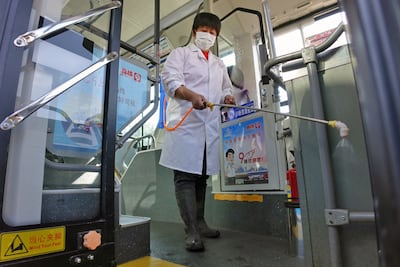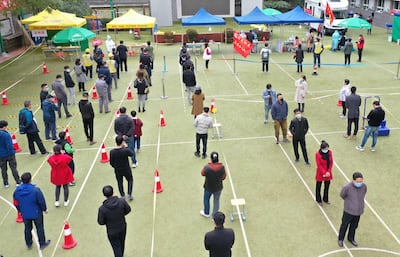China’s recent decision to postpone the Beijing and Wuhan marathons because of concerns over Covid-19 cases has shone a light on the country’s stringent efforts to combat the coronavirus.
The Wuhan marathon had been due to be held last Sunday, while the Beijing event was scheduled for this Sunday, but the plug has been pulled on both because of rising community transmission.
By international standards, China’s coronavirus case numbers of fewer than 100 a day remain remarkably low, especially considering this is the world’s most populous nation, with 1.4 billion people.
But in a country where elimination or eradication has been the aim, multiple community cases in several provinces are a major concern.
We look at China’s approach and consider how much longer the country will continue with its strategy.

What measures is China taking to control the coronavirus?
China locked down early and restricted internal travel and, as a result, has been successful at controlling the coronavirus while allowing life to mostly return to normal.
There have been just over 125,000 cases, according to World Health Organisation data, and the death toll remains less than 6,000.
“It’s still pursuing the eradication strategy and that isn’t likely to change any time soon,” said Dr Nicholas Thomas, an associate professor at City University of Hong Kong who researches how the disease affects the region.
Today, the country is continuing to introduce localised lockdowns where necessary, while international travel in both directions remains heavily restricted.
China is increasingly concerned about the spread of the Delta variant, which has proved far tougher to contain than other forms of the virus.
This week the government imposed a strict lockdown on the city of Lanzhou, which has four million people, because of a small number of cases.
Why has China continued with an eradication strategy when its population is heavily vaccinated?
China has fully vaccinated 71 per cent of its population and partly vaccinated a further 5 per cent, according to mid-September figures, which are the most recent published by Our World in Data.
Many other countries that have rolled out vaccines to this large a share of their population have opened up or are planning to, but China has continued to enforce strict border controls.
“The problem is that the main Chinese vaccines, Sinopharm and Sinovac, aren’t very efficient against the Delta variant, which is now dominant,” said Dr Thomas.
“If China is going to open up, it needs to be giving its population booster shots that are effective against the Delta variant … They need a booster shot vaccination regime probably based on mRNA technology.”
Sinopharm and other Chinese pharmaceutical companies have been working on mRNA vaccines and, according to Chinese media reports, production at one major facility was due to begin this month.
Just because a Covid-19 vaccine uses mRNA is not a guarantee of high efficacy, though. While the Pfizer-BioNTech and Moderna jabs have proved highly effective, another mRNA vaccine, from CureVac, produced disappointing results.

Is there a push to open up?
With far fewer Chinese people travelling overseas for holidays, the country’s citizens have been spending their money at home. As a result, the dragon economy achieved the rare feat last year of actually growing.
“In shutting its borders, the Chinese government has promoted the development of the domestic consumer market, which has been a long-term goal,” said Dr Thomas.
“The reality is that the domestic economy hasn’t taken such a large hit, so China has been able to focus on the public health responses.”
The relatively strong economy — although there have been jitters more recently — has, said Dr Thomas, helped the government to sidestep social or political problems over its strategy, although over the coming year China may lose out on investment to other countries where border restrictions have loosened.
This may lead to pressure to live with the virus rather than eradicate it. Dr Thomas thinks a change of approach is unlikely for now, however.
“Realistically we’re looking at least until the middle of next year if not the end of next year before there are any significant changes,” he said.











